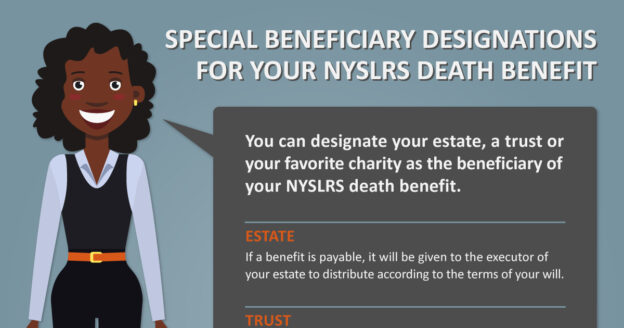NYSLRS retirement plans provide death benefits for beneficiaries of eligible members who die before retiring. If you are retired, your beneficiaries may be entitled to a post-retirement death benefit.
It’s important to name beneficiaries and review them periodically. Life circumstances sometimes change, and the beneficiary you named before might not be the one you would choose today. For example, if you just married, you may want to update your NYSLRS account information to name your new spouse as your beneficiary.
2 Types of Beneficiaries
- Your primary beneficiary will receive your death benefit. You can list more than one primary beneficiary. If you do, they will share the benefit equally. Or you can choose different percentages for each beneficiary to total 100 percent. (Example: John Doe, 50 percent; Jane Doe, 25 percent; and Mary Doe, 25 percent.)
- A contingent beneficiary will only receive a benefit if all your primary beneficiaries die before you do. If you list multiple contingent beneficiaries, they will share the benefit equally unless you choose different percentages.
Special Beneficiary Designations
Your beneficiary doesn’t have to be a person. You can name a charity, a trust or your estate as your beneficiary.

- Estate. When you die, your estate is the money and property you owned. Your death benefit will be given to the executor of your estate to be distributed according to the terms of your will. You can name your estate as the primary or contingent beneficiary of your death benefit. If you name your estate as the primary beneficiary, do not name a contingent beneficiary.
- Trust. You can name a trust as a primary or contingent beneficiary if you have a trust agreement or provided for a trust in your will. The trust itself would be your beneficiary, not the individuals for whom you established the trust. (Speak with your attorney if you’re thinking about making your trust a beneficiary.)
- Entity. You can also name any charitable, civic, religious, educational or health-related organization as a beneficiary.
- Minor children. If your beneficiary is under the age of 18 at the time of your death, your benefit will be paid to the child’s court-appointed guardian. You may instead choose a custodian to receive the benefit on the child’s behalf under the Uniform Transfers to Minors Act (UTMA). Custodians can be designated in Retirement Online or you can contact us for more information and the appropriate form before making this type of designation.
Keep Your Beneficiaries Up to Date
You can change your beneficiaries at any time. In addition to adding or removing them to reflect your current wishes, you should review the contact information for your named beneficiaries so we can find them when needed.
The fastest way to view or update your beneficiaries is in Retirement Online.
- Sign in to Retirement Online.
- In the ‘I Want to…’ section, click the “View and Update My Beneficiaries” button.
Find More Information
If you are not yet retired, you can read more about beneficiary designations in Life Changes: Why Should I Designate a Beneficiary?
If you are retired, you may wish to read our Can You Change Your Beneficiary After You Retire? blog post.

